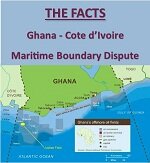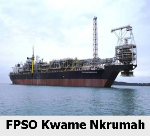Ghana Now In Control of Osagyefo Barge As Dispute Ends In The Hague
- Details
- Created on Friday, 04 April 2014 15:07
Ghana can now take full control of the Osagyefo Power Barge to boost its energy requirements.
This follows the ruling of the Permanent Court of Arbitration in The Hague for Ghana to pay $7 million and GH¢7.5 million to Balkan Energy (Ghana) Ltd in restitution damages.
The amount fell well below the $2 billion Balkan Energy was demanding from Ghana when it filed for arbitration on December 23, 2009.
The Attorney-General and Minister of Justice, Mrs Marietta Brew Appiah Opong, told the Daily Graphic that in a substantial decision issued on Tuesday, April 1, 2014, the tribunal rejected claims against the government of Ghana brought by project developer Balkan Energy (Ghana) Limited, an affiliate of Texas-based Balkan Energy Company.
Balkan had claimed damages totalling more than $3 billion based on a tolling fees provision in a long-term power purchase agreement (PPA) entered into in 2007 between Balkan and the Ministry of Energy.
Mrs Appiah Opong said while upholding the validity of the PPA, the tribunal established that Balkan had failed to perform its obligations under the PPA, which required the company to refurbish and commission the Osagyefo Power Barge, a 125-MW dual-fired power barge and associated facilities at Effasu in the Western Region.
She said the tribunal also rejected Balkan’s claim for over $40 million in damages for unjust enrichment, concluding that the evidence did not demonstrate that Balkan had conferred any demonstrable benefit on the government.
She said instead, the tribunal awarded Balkan limited damages of about $12 million for work performed and rejected the bulk of its claim of alleged expenditure.
Throwing more light on the issue, Mrs Appiah Opong said the tribunal held that the PPA was terminated and returned control of the barge to the government.
According to her, the government was further awarded $300,000 in damages, the maximum amount in damages that it could award the government under the PPA.
Mrs Appiah Opong explained that the tribunal also decided that the costs of the arbitration were to be shared between the parties.
The dispute
The dispute related to the PPA entered into between Ghana and Balkan on July 27, 2007 for the refurbishment and commissioning of the 125MW barge and associated facilities.
Balkan, under the PPA, was to commission the barge within 90 working days of the effective date, convert it into a combined cycle power plant by the addition of certain facilities, upgrade the capacity of the barge and invest in infrastructure to enable natural gas to be supplied to the barge, while the government was to ensure that all electricity necessary for the refurbishment and commissioning of the barge was provided.
In addition, Balkan was to construct and install the transmission lines required to connect the barge to the national grid, while the government of Ghana was to take and pay for all electricity generated by the barge.
Sources close to the Daily Graphic said the tribunal members examined Ghana’s Supreme Court rulings on aspects of the matter before arriving at its decision.
Findings of the Arbitration Tribunal
Briefing the Daily Graphic in Takoradi, the sources said the tribunal found the PPA between Ghana and Balkan Energy valid, saying the parties were entitled to rely on the PPA for the arbitration and expect that the government would, therefore, fulfill the obligations that were required of it.
Sources said on the request for tolling fees, the tribunal dismissed Balkan’s claim for over US$200 million and concluded that the conditions for charging tolling fees were not met because Balkan had not reached the stage in the commissioning process where it could have connected the power station to the transmission lines.
The tribunal felt that payment would only be due under the PPA if power were actually supplied or the power station was ready to supply it but could not do so for failure of grid connectivity attributable to the government.
Restitution Damages
The signals picked by the Daily Graphic said the tribunal ruled that Balkan be compensated for expenditure that was directly linked to the existence of the PPA that had plausibly contributed to the advancement of the commissioning of the barge and was sufficiently justified by evidence.
Consequently, it decided that the amounts owed by the government to Balkan as restitution damages were US$7 million and GH¢7.5 million, as against the $40 million sought by Balkan in restitution damages.
Incidental Damages
According to sources the tribunal concluded that Balkan’s claim for incidental damages of an amount of US$2,482 million resulting from the alleged unavailability of site electricity had been adequately compensated for by the award of restitution damages.
Other Awards
Although government officials were tight-lipped when contacted, the Daily Graphic can confirm that the tribunal awarded to Balkan US$50,000 for the government’s interference with Balkan’s conduct of business arising out of the arrest of its officer on suspicion of being involved in misappropriating the distributed control system (DCS) from the project site.
Our sources said the claim of $2,586 million in damages for conversion and trespass with respect to the DCS was denied by the tribunal.
Government’s Counter-claim
The Daily Graphic’s investigations indicated that the tribunal accepted the government’s counter-claim of US$300,000 in the light of the terms of the PPA for Balkan’s liability in terms of breach of contract.
The sources said the tribunal also ordered that the PPA should be terminated as of the date of the award to pave the way for the Ghana government to take possession of the barge.
The Minister of Energy and Petroleum, Mr Emmanuel Kofi-Armah Buah said the Japanese government gave Ghana a loan of $120million but was converted into a grant because of the country’s HIPC status and that amount was used to build the power plant at Effasu in anticipation of the gas from the Jubilee Fields.
He said the barge cost $67million and the rest of the money was meant for transmission and other services.
The expectation was that the gas to feed the barge could be obtained directly from the FPSO Kwame Nkrumah but a problem was noticed on the barge and it was decided that it must be refurbished.
Mr Buah said instead of asking the manufacturers to refurbish the barge, the government contracted Balkan from Texas to do the job, although it did not have the means to do so.
He disclosed that the government issued the company with a letter of credit which it used to secure more than $30million from a local bank.
That local bank, he indicated, was in court having sued Balkan for the repayment of the loan.
Mr Buah said Balkan did not do a good work on the barge, damaging certain parts of the barge in 2007/2008.
However, in 2009, Balkan presented a bill of $40 million, claiming it was the money it spent on the repair works, but when the government did its own due diligence it was realised that Balkan had spent $12 million.
The tango between the two led to the arbitration at The Hague for the past five years.
Background
Balkan Energy, on December 23, 2009, filed a case against Ghana at the Permanent Court of Arbitration in The Hague.
The company had alleged that the government breached its obligations under the PPA by providing inadequate or unreliable site electricity, failed to provide grid connectivity and failed to install a new Remote Terminal Unit/MicroSCADA which prevented Balkan from completing the final testing and commissioning of the power station.
It, therefore, claimed damages based on breach of contract, including incidental damages; breach of arbitration agreement, alternatively based on unjust enrichment, fraud/deceit, false arrest and conversion/trespass.
But the government denied all the claims of Balkan and contended that: the PPA was void under Article 181 (5) of the Constitution; even if the PPA was enforceable, Balkan was not entitled to any payments or damages under the terms of the PPA because it had failed to demonstrate it was entitled to tolling fees under the terms of the PPA and that Balkan had failed to establish that it was entitled to incidental damages relating to site electricity, grid connectivity, the RTU or the letter of credit.
The team of lawyers was drawn from the Attorney-General’s Department and the Ministry of Energy and Petroleum, assisted by external counsel, including Mr Jonathan Siegfried of the USA and Mr Fui S. Tsikata of Reindorf Chambers in Accra.
Source: graphic.com.gh






